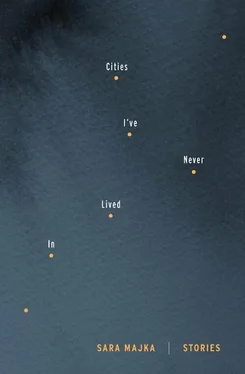She was at the bar, he said. She had told me she might be going out. I hadn’t seen her for a while so I went.
There was a band at the bar and he didn’t like the noise. He wanted to leave, but she was with friends. He could smell her shampoo, that was how close they stood, but when bar seats freed up he found himself next to a woman he didn’t know. Louise sat turned away from him. He had thought to go to the bathroom just to get away, but walked out the back door to the harbor. Then the group gathered around him on the pier as if it had been planned, some of them smoking. She was drunker than before and stood apart, looking at the ocean.
He approached her. When he had walked into the bar, she looked up and smiled. Now she turned toward the wind, took an elastic from her wrist, tried to pull her hair up, and then let it fall. He lifted a hand as if to smooth her hair, but pulled his hand back.
I’m going, if you want a ride home, he said.
She mentioned another bar they were going to; he hadn’t paid attention and told her to take a taxi home. Probably she didn’t hear. The group had splintered. She started to stumble. Maybe the shots had taken a while to hit, or maybe how subdued she was had hidden how drunk, or maybe his presence had organized her. Her arm floated up to point at the moon. The moon , she said, there is the moon. Then she felt like sitting. She climbed a ladder down to the sand, took off her shoes, and balled the socks into the shoes. She sat on a rock with her purse in her lap.
She remembered living on an island years ago and lying on the dock, the stars overhead and jellyfish in the water, the rowboats tied with rope that dragged with seaweed. She had lain down with some of the other people from the farm, and thought, The world opens immeasurably. She would have felt it like something opening inside of her. Then she had slipped into the water while the other people from the farm talked on the dock. The little dipper, someone said, count the stars. The water was so cold that she gasped. Louise? someone had said. She was in between the rowboats, in the space where one was missing and the others swayed to meet but didn’t. She kicked out. Cold? someone asked. So cold , she said, kicking away. She hadn’t even been wrong that the world opens immeasurably — it does — but it also does something to you, all those jolts and shocks.
She kept a flask in her purse and decided to drink, but then her friends from the bar called from above, so she put down the flask and put her shoes on. Later she would remember the flask, climb back down to look for it. Somehow her shoes would end up there. My sense of it starts to break down here. She was feeling chaotic, things were happening too quickly, in the bar then not in the bar, climbing down the ladder, taking off her shoes, drinking the rum. Then she was up again, on the pier. Where are your shoes? someone asked. She didn’t know anyone, but she stood in the crowd as if she did. People asked about her shoes. The last person who’d asked was the one they interviewed. He was with a group of college guys; they were young and intensely interested in her shoes, they kept asking her, but then the interest dissolved, something else, as if they were goldfish turning in a pool, attracted their interest.
And you were lovers, I said to Alec.
It was over, really, at that point.
Have you been to see the police?
Yes, he said. Right away, the next day.
They showed him security footage from the pier. The police had charted each person who went down, when each passed, and when each came back. They had pointed him out. He looked upset, they told him. Angry, like something was going on, they said, pointing their fingers at the screen. He told them that he loved her. He knew he’d made a mistake, so he quickly tried to fill the hole. He told them that she was troubled. I wanted to help, he said, but there was nothing I could do. He talked too fast, keeping his eyes on his hands. At first they found him guilty, strange, but at some point the tension in the room eased. They stopped paying attention, thought about dinner, home. No one thought, Poor guy. No one thought much of anything. Mostly they didn’t like him, though they would never have been able to say precisely why.
I said, You know there was nothing that you could have done, but he didn’t say anything. A few weeks later he cut his first map. He slid it in his bag, walked out of the library, and stopped on the steps. The pain on his face would be clear. He wouldn’t notice a woman standing under a tree, watching him, trying to understand.
At home we listened to the radio. They had found the body. My husband called from inside the screens: Anne, he said, Anne, come here. I sat with him; he relaxed and lifted one of the newspapers from the floor. Gases bring the body up, he said, gases and temperature. I don’t really understand. Tides play a part. They’re saying it was an accident.
The lamp lit the orange of the screens and illuminated the space.
Later, I found him sitting on the bed with his head bowed. He was crying. I’m very sorry, he said. There was a tattered cover on the bed with dull squares of burgundy, rust, and light blue. He put one hand over his eyes and I sat behind him and placed a hand flat on his back and stayed like that for some time, while rice cooked in our alcove kitchen. I felt a sudden enlarging of space, with sacks of half-put-away groceries on the counter, the sagging bag of rice scattering kernels everywhere, everything acquiring significance, more beautiful than the many beautiful things I had seen, more beautiful even than the harbor had ever seemed to me. One hand shaking as I scooped rice into an open palm, husband still sitting on the bed, the apartment darkened and the lamp still on inside the screens, now glowing as if there was a heart inside. Husband in near dark, sitting on a faded quilt. His coat still on, as if he had known, in preparation for a shock, that he might need it.
In 1963, an eleven-year-old boy named Peter Harville was committed to a state mental hospital in the western part of Maine, far from the island where he grew up. He had cut his wrists with his father’s coping saw, and lay on the ground watching the sawdust turn red until someone opened the door. Peter? his father asked, not moving or coming in. Peter? Are you all right? Peter noticed that his father spoke more gently than usual, and the shed felt warm and calm; for the moment he was happy.
The next week his mother packed a bag for him and his father took him on the ferry, then into the Cutlass sedan that was kept in the lot on the mainland with a key under the seat for anyone on the island who had an errand to run. They were at the hospital by three. Afterward, the father checked into a hotel. He went to the bar across the street and had several pints of beer. It had been ten years since he’d spent a night off island and he studied the line of coasters taped to the wall behind the bar. His hands twitched on the counter. They were small-boned and fine, adept at gutting fish and killing the lambs during the summer slaughter, thinking of their bodies dangling in the walk-in no more than he thought of anything else.
In the hotel room, he took off all his clothes and folded back the sheets, then slid inside and tried to sleep. When he got home, his wife listed object after object, asking if they’d let Peter keep it.
Sometimes I dream about him, she said to her friend Eleanor. They were hanging laundry; the wind came up the grassy slope and blew all the soft clothes on the line, the chambray shirts and white cotton sheets, her blue nightgown with lace along the neckline.
While her friend clipped, Helen stared across the sea. She felt as though she had lost something but she kept forgetting what it was, and when she remembered she couldn’t understand it. Do you suppose it’s a long trip? Helen asked, her voice sounding like it arose from a daydream. The idea had come to her over days, like a bubble expanding in the back of her mind, that it had been a mistake, that she would take the ferry, find the car, drive to the hospital, tell the doctors it had been an accident with the saw, that it wasn’t true what her husband said about Peter.
Читать дальше












